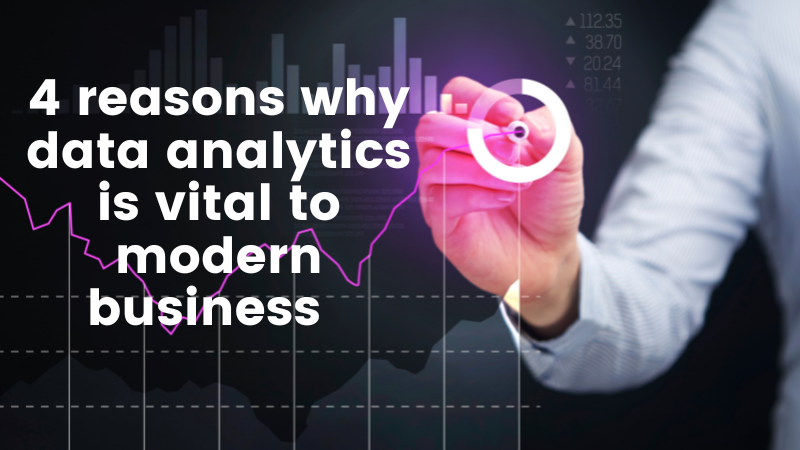As digital transformation and big data continue to shape modern business through the use of intelligent software, hardware, and data-informed processes, business leaders are tasked with sorting, organizing, and making the most efficient use of collected insights to better understand the needs of their audience.
Simply gathering vast amounts of high-quality information is no longer enough to gain a competitive advantage; in today’s markets, organizations that are able to make data-backed decisions and form entire business strategies informed by data insights will find themselves in an advantageous position.
Data analytics has become central to the growth and success of modern businesses, allowing leaders to react faster and better address the needs of changing audience opinions as well as act to optimize the performance of internal systems and departments. But making the most intelligent use of collected insights requires dedicated focus and vision; here’s why data analytics is vital to modern business.
What is data analytics?
Table of Contents
Data analytics is the process of collecting and making actionable sense of raw data to gain valuable insights and conclusions regarding audience and market behaviors. By structuring large quantities of relevant data, businesses can begin to understand the underlying patterns and tendencies controlling the market, with this information forming the basis of effective marketing and operational strategies.
Types of data analytics
Modern data analytics will generally fall into one of four primary categories, these include:
- Predictive analytics – Using data to predict specific actions that are likely to impact business operations based on previous market trends and consumer behaviors
- Descriptive analytics – Using data to describe actions that have already occurred, such as an increase in revenue or website traffic, to strengthen operations moving forward
- Prescriptive analytics – Using data to suggest actions that will likely be beneficial to the business backed by previous data pertaining to the subject in question
- Diagnostic analytics – Using data to understand why a particular event or market trend has occurred to help businesses repeat positive behaviors and avoid damaging decisions
Utilizing a combination of these data analysis processes to support all major business decisions will help leaders to navigate volatile markets and avoid costly mistakes. To understand why data analytics has become essential to modern business, here are 4 key benefits explained in a little more detail.
1. Enhanced decision-making
Well-structured and monitored data analytics allows businesses to make fact-based decisions with unmatched speed and efficiency, in turn helping teams to avoid wasting their resources on ineffective or unproven operational strategies. In essence, by ensuring that all business decisions are backed by proven data insights, teams can avoid taking presumptive actions that could harm long-term projects.
In the modern world, gathering data is perhaps easier than ever. In fact, it’s estimated that 90% of all available data has been produced within the last few years, meaning businesses intending to utilize data analytics to enhance decision-making processes must be selective when collecting information.
Leaders must understand that effective data analysis is only ever as accurate as the information that the system is provided, meaning strong visible patterns or suggested outcomes should only be trusted if teams are confident that their data analysis processes are well-optimized and flawless in operation.
2. Target market insights
Customer data is an incredibly valuable commodity in relation to modern business, with recent reports suggesting that as many as 64% of business owners collect customer data from social media sites, and 71% of companies actively collect personal data from customers in large geographic markets like the EU, but why has this information become so desirable to companies operating in global markets?
In simple terms, when businesses have access to their audience’s digital footprints, they’re able to produce clear and provable insights regarding customer preferences, desires, and purchasing habits. By analyzing digital data that many consumers would otherwise keep to themselves, businesses are able to identify subtle trends and quickly act to customize their products to address consumer needs.
The more factual insights that a business has pertaining to their specific target audience, the easier it becomes to tailor operational and marketing strategies to address relevant pain points, in turn helping to nurture customer loyalty, influence positive engagement and grow sales to outperform competitors.
3. Improved risk management
For businesses operating in competitive markets, often the determining factors between success and failure will be decided by close margins, but by utilizing data analytics, teams are able to identify and act upon opportunities to reduce costs, streamline operations and maximize resulting financial profits.
High-quality and relevant data can be used to predict the most likely outcome produced by marketing campaigns, changes to production techniques and alterations to offered services, essentially allowing teams to visualize and understand potentially risky changes before committing any time or resources.
Data analysis can also be used to improve risk management with regard to business security. For example, teams can work alongside a commercial security cameras installation expert to develop physical security systems informed by data analysis programs. CCTV footage can then be analyzed to identify potential flaws and security risks that can be strengthened to reduce the likelihood of theft or breach events.
4. Identifying new opportunities
Ongoing data analytics programs can provide businesses with real-time insights used to monitor customer needs, consumer feedback, and product performance in relation to direct competitors, helping teams identify new marketing avenues and develop products intended to suit novel needs.
By providing marketing and product development teams with usable data illustrating patterns in consumer behavior, leaders can analyze similar or tangential products and services that existing audiences are interested in. This information can then be used to both improve current offerings as well as branch out into new opportunities with minimal risk that such efforts will ultimately result in wasted resources.
This process of predictive data analysis can also be used to convince investors that decisions to grow certain business operations into new markets will likely be met with success, as well as allow teams heading large internal projects to plan operations in advance in relation to high-quality data insights.

Conclusion
As consumer information continues to prove essential to companies and marketing teams looking to navigate increasingly competitive global markets, data analysts and data analytics programs will only become more vital to modern business operations. By ensuring that all marketing and operational decisions are backed by high-quality data, teams can better protect themselves from potential risks.
Well-implemented data analytics processes allow business leaders to make informed decisions, gain a deeper understanding of target markets, enact effective risk management procedures and identify new opportunities that can help businesses to strengthen and grow to the benefit of all consumers.


